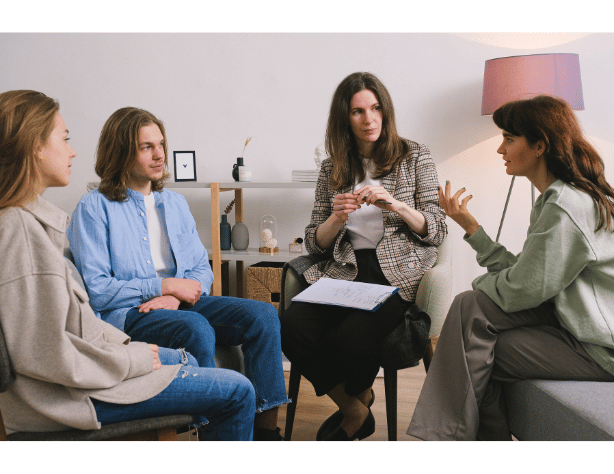Borderline Personality Disorder (BPD) or Intense Emotions

Understanding Borderline Personality Disorder: Online Counseling in Georgia
If you’re someone who feels emotions strongly, often has reactions that seem out of proportion to situations, or have a diagnosis of Borderline Personality Disorder (BPD), we can work together to bring balance and regulate the emotions that dominate your life.
People who experience intense emotions sometimes have trouble calming down after intense situations and coping with distress.
Inside, you’re simply trying to find relief from the storm of emotions and thoughts you’re experiencing.
To other people, such verbal or physical outbursts are misunderstood or ridiculed.
For some, this can involve engaging in behaviors like cutting, burning, and punching themselves in an effort to cope with the emotional pain.
For others, impulsive behaviors like shopping sprees, eating binges, and alcohol and drug use are never-ending cycles.
No matter how you have tried to cope with intense emotions, you can feel assured that my approach is patient, understanding, and absent of judgment.


Empathetic Guidance on BPD: What Can Intense Emotions or Borderline Personality Effect?
- Difficulty controlling your reactions and behaviors, especially when stressed.
- Relationships with family, friends, and coworkers
- Productivity, motivation, and sleep
- Increased use of alcohol, drugs, or non-prescribed use of medications
- Neglecting household and parenting expectations
- Financial or legal issues
Unlocking Hope: What Change Can Look Like For Those with BPD
- Ability to regulate emotions, tolerate stress, and have greater awareness
- Stability of thoughts and reactions
- Specific strategies customized to you that help you cope with difficult situations and relationships
- Confidence in your decisions and improved self-esteem
- Better relationships with family, friends, and coworkers


What Can I Expect in Session?
- A thorough assessment of your concerns, symptoms, and collaboration together in setting your treatment goals
- DBT-informed skills and strategies personalized to you
- Customized access to resources to support you outside of sessions
- Assessment and needed adjustments based on how you feel the tools and techniques provided are helping you
- Involvement of partners or family members in sessions based on goals and desires
- Collaboration with any physicians or prescribers that you would like to be involved in your treatment approach
What Comes Next
Schedule a free 15-minute consultation call with the therapist you would like to work with or fill out our potential client form here. From there, you will set up your first session, also known as an intake session. With your chosen therapist, let them know a bit about your concern, your history with past treatment, ask about our fees, and the best days and times to attend therapy sessions.
Fees
Each therapist at Sage Counseling and Wellness has their own fee structure. When you have the initial consultation call with your therapist, you will discuss your fee with them.
Our therapists do not participate in-network with any insurance companies. Clients pay their therapist each time they come to a session and are then emailed an insurance-compatible statement at the end of each month to send to their insurance companies for out-of-network reimbursement called a superbill. Each insurance company varies on what reimbursement they give for psychotherapy out of network. You may want to check with your insurance company to find out what they offer for psychotherapy with a therapist with your therapist’s particular licensure in Georgia.
What Can I Expect at My First Therapy Appointment?
Many people have fears, assumptions, and at times, no idea at all about what therapy will be like the first time they come in for a first session. We would also encourage you to reach out and ask your therapist any questions you have about what therapy will be like with them.
Each therapist has their own way of approaching their work. But here are some things that may happen in your first session here at Sage Counseling and Wellness:
- When you start your first online appointment, you’ll be in the virtual waiting room.
- While you wait for your appointment, take a moment to breathe, look over any thoughts or items you’d like to share in the session, and perhaps take a restroom break beforehand so you can be fully present.
- As sessions are virtual, you can sit however you want to sit comfortably. Some clients prefer to sit at a desk, others in a comfy chair with a laptop or tablet, and some others sit on the floor on a yoga mat to stretch while in session. It’s completely up to you.
- In your first session, your therapist will likely remind you that what you talk about in session is completely confidential with a few legal and ethical exceptions, which will be explained to you (and which are outlined in our consent to treatment document). If you have any questions about those policies, you’re encouraged to ask!
- Your therapist might discuss any other policies they have (cancellation, payment, session length, scheduling, or other ‘frequently asked questions’). This all only takes a few minutes.
- Then, depending on the level of crisis that you’re currently experiencing, your therapist might review their particular style of therapy, discuss your intake form with you, begin a more thorough assessment of your history, or just ask you what brings you in at that particular time. From there on, it’s a conversation and there are no right or wrong things for you to say — the only thing you can do ‘wrong’ at that point is to be dishonest, and in doing so you would only slow down your progress. If there is something about your therapist that seems like it would get in the way of you feeling comfortable being honest, you can say so, and your therapist may be able to help you feel more comfortable. We want you to feel comfortable and confident with your therapist. If at any time you don’t, please let them know or let the director know.
- Your therapist may or may not take notes, depending on their treatment style. These notes are also confidential unless you consent to their release, and they are kept safely in our electronic health record system.
- Therapy is a safe space to show your vulnerability so crying is perfectly acceptable.
- You’ll pay for your session at the end, generally, via your credit card on file.
- You can discuss a regular meeting time with your therapist so that this time becomes your reserved time. This helps in accountability for you to work on your progress as well.
